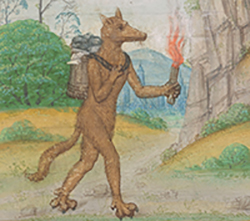 Released yesterday, the second report from participants of the CLIR Postdoctoral Fellowship Program, A Splendid Torch: Learning and Teaching in Today’s Academic Libraries, included as many exciting challenges and opportunities as the first volume, The Process of Discovery: The CLIR Postdoctoral Fellowship Program and the Future of the Academy. Challenges included narrowing in on topics within the field of scholarly teaching and learning and organizing an engaging, open peer-review process, while opportunities included collaborating with a diverse, engaging group of over 25 authors. Perhaps the biggest challenge, however, was finding an image as apt as Rocket Cat for the report’s cover. Thanks to Twitter, Erin Connelly, and The Rosenbach, we found Reynard the Fox.
Released yesterday, the second report from participants of the CLIR Postdoctoral Fellowship Program, A Splendid Torch: Learning and Teaching in Today’s Academic Libraries, included as many exciting challenges and opportunities as the first volume, The Process of Discovery: The CLIR Postdoctoral Fellowship Program and the Future of the Academy. Challenges included narrowing in on topics within the field of scholarly teaching and learning and organizing an engaging, open peer-review process, while opportunities included collaborating with a diverse, engaging group of over 25 authors. Perhaps the biggest challenge, however, was finding an image as apt as Rocket Cat for the report’s cover. Thanks to Twitter, Erin Connelly, and The Rosenbach, we found Reynard the Fox.
The image of this intrepid fox is well suited for the report’s chosen title. A Splendid Torch harkens back to No Brief Candle: Reconceiving Research Libraries for the 21st Century, published by CLIR in 2008, and both are inspired by a quote attributed to George Bernard Shaw:
I am of the opinion that my life belongs to the community, and as long as I live, it is my privilege to do for it whatever I can. I want to be thoroughly used up when I die, for the harder I work, the more I live. Life is no ‘brief candle’ to me. It is a sort of splendid torch which I have got hold of for a moment, and I want to make it burn as brightly as possible before handing it on to the future generations.
In typical CLIR fashion, experimentation and collaboration were two key themes in crafting the report. One experiment was bringing me on board as a project manager and co-editor to accompany seasoned professionals John Maclachlan and Christa Williford. Another was to have an open peer review. This allowed members of our communities to not only critique the essays, but to see each other’s comments and add to them. My coauthors and I are grateful to all of our colleagues who lent their valuable time and insight to this process.
Almost a decade on from No Brief Candle, A Splendid Torch is a practical follow up filled with case studies illustrating how research libraries (their people, their spaces, and their technology) are integrating their work into the process of teaching and learning. Each chapter illustrates what can be achieved through collaboration with the wider academic community. The case studies illustrate both success and failure, and the things in between.
Collaboration was not just a part of the writing and review process, but was integral to the many case studies included in the report. For example, the first essay, “Handing on the Splendid Torch,” relied on insight and comments from faculty, librarians, and staff at the libraries profiled. “Creating Contact Zones in a “Post-Truth” Era” is a story of the trials, tribulations, and positive impacts of a faculty member proactively seeking out collaboration with libraries. In addition to other themes, “Exploring How and Why Digital Humanities Is Taught in Libraries” identifies the importance of informal communities in teaching digital humanities through libraries. “Current Use and Prospective Future of the University Map Library” is the first report essay to include authors who are not postdoctoral fellows. In taking this step, lead author John Maclachlan was able to highlight the voices of colleagues and of students. The essay, “New Opportunities for Collaboration in the Age of Digital Special Collections,” takes a deep look at increasing engagement with special collections. “Shiny Things,” the final essay in the report, highlights how collaborative 3D modeling and printing projects can contribute to learning and teaching. This report and the essays within it, propose positive, proactive ways to contribute to and navigate the “post-secondary landscape” mentioned by Lauren Coats and Elliott Shore in the Afterword.
For the editors of The Process of Discovery, Rocket Cat and their bird friend symbolize the tongue-in-cheek concept of “postdoctoral fellows as ‘feral librarians’ or infiltrators in the world of academic libraries” and “the fear, but also excitement, of launching into a new, challenging endeavor.” For The Splendid Torch, Reynard symbolizes the fact that postdoctoral fellows are willing and able to pick up the torch of experimentation and collaboration and move forward together alongside library and teaching colleagues as we continue to seek better pathways to more effective teaching and learning.
Jodi Reeves Eyre is co-founder of Eyre & Israel, LLC and a former CLIR/DLF Fellow in Data Curation for the Sciences and Social Sciences. She is a co-editor, together with John Maclachlan (McMaster University) and Christa Williford (CLIR), of CLIR’s recent publication, A Splendid Torch: Learning and Teaching in Today’s Academic Libraries.

